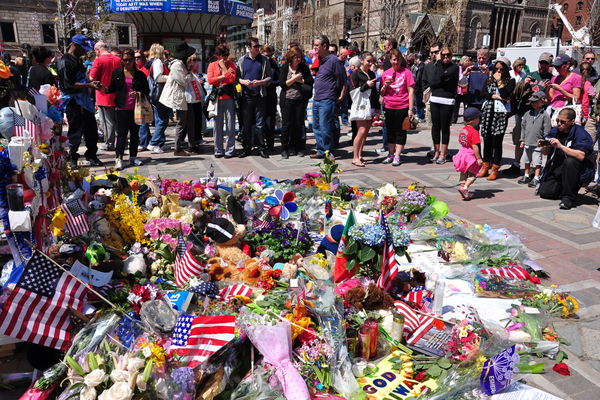Researchers developing Boston Marathon digital archive

A team of digital humanities researchers at Northeastern is leading the development of a comprehensive digital archive featuring stories, photos, videos, oral histories, social media, and other materials related to last month’s tragic Boston Marathon bombings. The group will engage the public for the first time on Saturday at #onerun, an event for Boston Marathon runners who didn’t finish the race to finally complete the final mile.
Our Marathon is project run through Northeastern’s NULab for Texts, Maps, and Networks—the university’s research-based center for Digital Humanities and Computational Social Science. The archive will serve as a long-term memorial that preserves these records for students and researchers, provides an important resource for future historians, and creates an environment for the public to share its experiences.
At Saturday’s #onerun event, the NULab team will have a station set up for visitors interested in providing on-camera interviews that will be archived on the Our Marathon website. The team will also have laptops available to show visitors how to upload content directly through the site, which is still in beta form.
“This archive is really a way to help with healing process and preserve these memories for the historical record,” said Ryan Cordell, an assistant professor of English and Our Marathon’s project manager. “We want to capture as many materials as we can that help tell the stories—not just the what happened, but how people experienced what happened.”
The NULab team will hold more public outreach events throughout the summer to spread awareness and encourage the community to participate while memories are still fresh in people’s minds. The team is also exploring partnerships with media organizations, government officials, and other universities to grow the project and increase its impact.
In related news, NULab co-director David Lazer has been analyzing the texts and tweets sent out following the bombings to further understand how people use their social networks during emergencies. This data, which he said he could be used to improve emergency response, will also included in the digital archive.
These projects are among a number of ongoing efforts at the NULab and across the university that exemplify Northeastern’s leadership in the emerging field of digital humanities, which falls at that intersection of computational and social sciences.
“Digital humanities is a very publicly engaged field,” Cordell said. “Digital projects are highly visible and interactive, and the Our Marathon project will allow the NULab to build on the strengths it’s cultivating here by creating a public project that benefits the community.”
The Boston Marathon bombings on April 15 killed three people, injured more than 260, and left the entire nation grappling with its emotions in the wake of the tragedy. A week after the bombings, and only days after a tense manhunt for one of the suspected bombers concluded with his capture, English professor Elizabeth Maddock Dillon listened as her graduate students shared their unique connections to the attack. Struck by how each student had his or her own story to tell, Dillon emailed her colleagues at the NULab with her observation, sparking a conversation about ways to collect all these stories in one place. From there, the Our Marathon project took shape.
Dillon, co-director of the NULab, envisions the digital archive as a multipurpose database, one whose collections of stories will help the community heal, facilitate a wide variety of future research, and serve as resource for community building.
“My sense of this archive is that it would tell the story of the entire community,” she said.
Members of the Northeastern community who have a story or other media related to the marathon events can contribute to the archive at http://marathon.neu.edu. Students, alumni, or other community members interested in volunteering alongside Northeastern’s Our Marathon team this summer can email marathon@neu.edu for more information.






